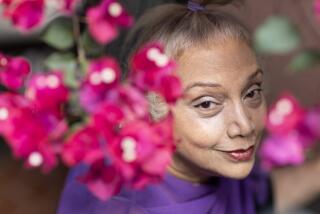Exotic Globe-Trotter
- Share via
“Did you think I was ugly?” asked the beautiful woman sitting on the couch of her hotel room.
Well. . . .
Blame the odd cover of her album, “Shaday,” for prompting Israeli singer Ofra Haza to pose that startling question. Before meeting her, it wasn’t clear what she looked like, since on that album-cover head shot, both hands are covering her face.
“Surprised at how I look?” she asked, smiling devilishly.
Actually, more surprised that Sire Records would put out such a misleading cover. When an unknown artist’s face is virtually hidden that way, it’s only natural to assume that image-conscious label execs were hiding a face that’s not terribly attractive.
“I’d hate for people to get the wrong impression about me,” she said.
Haza, who just turned 30, is a beauty who is as exotic as her music. On this album, her first American release, she sings in Yemenite and ancient Hebrew as well as in English. Her single, “Im Nin’ Alu,” is a dance-club favorite. But her high, piercing voice is actually better showcased on some of the LP’s ballads, like the spine-tingling, a cappella “Love Songs.”
Haza is such a big star in her country that’s she’s often called the Israeli Streisand. But in the past year, Haza, one of the hottest performers on the World Beat scene, has spent most of her time globe-trotting, drumming up interest in her album throughout Europe and parts of South America.
Born in Israel to Yemenite parents, Haza, one of nine children, joined a local theater troupe for fun when she was 13. By her late teens she was the troupe’s singing star and had already recorded the first of her 20 albums.
In Israel, Haza is known for singing Israeli folk and pop songs. But she’s attracted a worldwide audience since deciding a few years ago to add a dance beat to some of those traditional numbers.
“The sound of those songs is strange and mysterious and intriguing to people outside my country,” she said. “A song like ‘Im Nin’ Alu’ is partly in English but most of it is in Yemenite. People don’t understand the words but they like the music and the rhythms.”
Singing in English, as she does for the first time on “Shaday,” has also helped broaden her audience. “It’s not easy singing in a language, like English, that’s not your own,” she explained. “But I had to do it to reach more people. It was time for me to expand beyond my country, to taste more of the world. . . . “
She smiled devilishly again.
” . . . and to give the world a taste of me.”
More to Read
The biggest entertainment stories
Get our big stories about Hollywood, film, television, music, arts, culture and more right in your inbox as soon as they publish.
You may occasionally receive promotional content from the Los Angeles Times.








